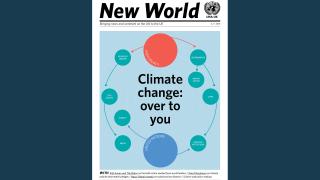
The region of Latin America has the potential to significantly advance climate change debates and policies by developing a human rights perspective on the greatest societal challenge of the 21st century.
Latin America is well known for its extraordinary biodiversity and its long-term position as an agricultural powerhouse. In recent decades, Latin America’s very healthy economic growth has been based on the export of the region’s extensive natural resources, and in large part driven by China’s fast-paced industrial development. In a region dependent on its natural environment for economic and social development, the risks of rapid and irreversible climate change are very serious indeed.
The effects of climate change in Latin America are already apparent, yet still not widely recognised. The Interamerican Association for Environmental Defense, for example, has documented the particularly acute climate change risks in Latin America, including the loss of freshwater resources and droughts; the increased frequency of extreme storms and flooding; rising sea-levels and the destruction of marine ecosystem; and the spread of heat-related and vector-borne diseases.
The direct impacts on a broad range of human rights – from access to food and clean water and minimum standards of health, to the enjoyment of a safe environment – that result from such ongoing consequences of climate change are severe, with socially marginalised communities often disproportionately affected. Indigenous peoples and peasant farmers, for example, rely more heavily on natural systems for their livelihoods, so climate change will be most strongly felt in these communities. Given the cultural and spiritual significance of ancestral lands and ecosystems for many indigenous communities, moreover, climate change poses a very real existential threat to such groups.
It is also increasingly recognised that some climate change adaptation policies currently being pursued also have adverse human rights consequences. Take the production of biofuels, for example, which has been promoted as an important clean energy alternative and as a way to reduce greenhouse gases. Clean fuel for cars in Europe and North America, however, also risks shifting land use away from agriculture in Latin America, potentially threatening local capacities to realise the right to food.
The magnitude of the economic, social, and political changes required to mitigate the multiple impacts of climate change in the region of Latin America may appear overwhelming. Against these challenges, a human rights perspective on climate change identifies key principles that would need to shape government as well as societal mitigation strategies.
At its most general, international human rights law holds that governments have obligations to protect the human rights of all those within their borders, including against both current and future effects of climate change. More specifically, however, a human rights approach offers an important corrective to the principle of Common but Differentiated Responsibility (CBDR) that has informed global climate change negotiations since the early 1990s. The principle of CBDR affirms that developed countries, which have contributed disproportionately to global warming, must assume greater responsibilities and assist developing countries in adapting to climate change and support the development of appropriate mitigation strategies.
From an equity perspective, the principle of CBDR seeks to allocate differentiated responsibilities for adaptation according to countries’ contributions. From a human rights perspective, however, the principle of CBDR does not adequately capture the various vulnerabilities to climate change that exist within societies, particularly in a region such as Latin America with its huge socio-economic disparities and gaping inequalities.
Indeed, Latin American countries have been strong proponents of the principle of CBDR in international climate change negotiations. In contrast, they have been less forthcoming in supporting efforts to promote a human rights perspective on climate change that would both recognise and mitigate the differentiated impacts of climate change on vulnerable groups within their societies. The Paris climate conference in December offers an important opportunity to redress these failings.
Dr Par Engstrom is Lecturer in Human Rights of the Americas at the UCL Institute of the Americas and Co-Chair of the London Transitional Justice Network

















